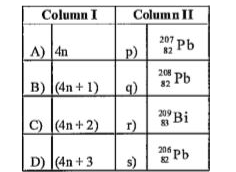Statement 1 :In a nuclear fission process, the total massof fragments is always greater than the original nuclei.
Statement 2 : Difference in the mass due to fission of a heavy nucleus is converted into energy according t mass - energy conversion. Solution in Malayalam
Statement 1 is True, statement 2 is True, Statement 2 is Correct explanation for Statement I.
Statement 1 is True, Statement 2 is True, Statement 2 is NOT a correct explanation for Statement 1.
Statement 1 is True, Statement 2 is False.
Statement 1 is False, Statement 2 is True.
The correct Answer is:D
Step by step video, text & image solution for Statement 1 :In a nuclear fission process, the total massof fragments is always greater than the original nuclei. Statement 2 : Difference in the mass due to fission of a heavy nucleus is converted into energy according t mass - energy conversion. by Chemistry experts to help you in doubts & scoring excellent marks in Class 12 exams.
Topper's Solved these Questions
- BOOK - BRILLIANT PUBLICATIONCHAPTER - NUCLEAR CHEMISTRY EXERCISE - LEVEL-III (Linked Comprehension Type)11videos
NUCLEAR CHEMISTRY
- BOOK - BRILLIANT PUBLICATIONCHAPTER - NUCLEAR CHEMISTRY EXERCISE - LEVEL-III (Matching Column Type)5videos
NUCLEAR CHEMISTRY
- BOOK - BRILLIANT PUBLICATIONCHAPTER - NITROGEN COMPOUNDSEXERCISE - LEVEL-III (Linked Comprehension Type)9videos
NITROGEN COMPOUNDS
- BOOK - BRILLIANT PUBLICATIONCHAPTER - P-BLOCK ELEMENTSEXERCISE - LEVEL-III50videos
P-BLOCK ELEMENTS
Similar Questions
A sample contains 10−2 kg of two substances A and B with half lives of 4 and 8 sec repsectively (Given that atomic mass of B is twice of A ).
The mass of A and B left after 16 second is :04:08View SolutionMatch the series (in Column I) with the end product (in Column II).
 02:51View Solution
02:51View SolutionMixture of two isomeric amines (C2H7N)A and B was treated with benzene sulphonyl chloride and NaOH and ether were added. Two layers were separated. Ethereal layer containing A on acidification followed by distillation generates A . Aqueous layer containing (B) followed by acidification and distillation generates (B)
Compound in ethereal layer is in the form01:51View SolutionWhich of the following is the correct statement
View SolutionEnergy is released in nuclear fission. Total binding energy of the fission fragments is large than the total binding energy of the parent nucleus.
View SolutionIn nuclear fission , 0.1% mass in converted into energy. The energy released in the fission of 1Kg mass is
View SolutionIn nuclear fission 0.1% mass is converted into energy How much electrical energy can be generated by the fission of 1 kg of fuel ?
02:11View SolutionAssertion : In a fission reaction a heavy nucleus is broken into three fragement of nearly equal mass . Reason: The binding energy per nucleon for a heavy nuclei is less than the binding energy per nucleon of the fragments.
View SolutionIn nuclear fission, 0.01% mass is converted into energy. The energy released by the fission of 100 kg mass will be:
05:22View Solution(A) In a nuclear fission process, the total mass of fragment is always greater than the mass of the original nucleus.
(R ) Difference in the mass due to the fission of a heavy nucleus is converted into energy according to mass-energy conversion.03:33View Solutionनाभिकीय विखण्डन में कितनेक प्रतिशत द्रव्यमान ऊर्जा में बदलता है?
03:53View SolutionStatement I: In fission the percentage of mass converted into energy is 0.1%.
Statement II : In fusion the percentage of mass converted into energy is 100%.View SolutionA : नाभिकीय विखंडन में ऊर्जा मोचित होती है।
R : विखंडन खंडों की कुल बंधन ऊर्जा , मूल नाभिक की कुल बंधन ऊर्जा से ज़्यादा होती है।View Solutionवक्तव्य I नाभिकीय विखंडन में ऊर्जा मुक्त होती है।
वक्तव्य II विखंडित भाग की कुल बंधन ऊर्जा का मान माता नाभिक की कुल बंधन ऊर्जा से अधिक होता है।02:41View Solutionकथन : नाभिकीय विखंडन में ऊर्जा उत्पन्न होती है।
कारण: विखंडन घटकों की सम्पूर्ण बंधन ऊर्जा जनक नाभिक की कुल बंधन ऊर्जा से अधिक होती है।02:38View SolutionIn a nuclear fission 0.1% of mass is converted into energy. The energy released by the fission of 1kg mass is
02:23View Solution

